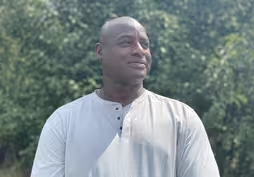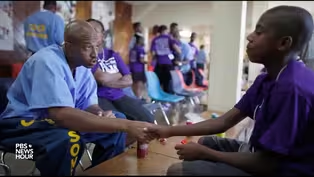
Searching For Justice | Part 2
Special | 7m 12sVideo has Closed Captions
The vicious cycle of incarceration and homelessness
PBS NewsHour exposes the real-life struggles facing formerly incarcerated Americans as they reenter their communities.
Problems playing video? | Closed Captioning Feedback
Problems playing video? | Closed Captioning Feedback
Major corporate funding for the PBS News Hour is provided by BDO, BNSF, Consumer Cellular, American Cruise Lines, and Raymond James. Funding for the PBS NewsHour Weekend is provided by...

Searching For Justice | Part 2
Special | 7m 12sVideo has Closed Captions
PBS NewsHour exposes the real-life struggles facing formerly incarcerated Americans as they reenter their communities.
Problems playing video? | Closed Captioning Feedback
How to Watch PBS News Hour
PBS News Hour is available to stream on pbs.org and the free PBS App, available on iPhone, Apple TV, Android TV, Android smartphones, Amazon Fire TV, Amazon Fire Tablet, Roku, Samsung Smart TV, and Vizio.
Providing Support for PBS.org
Learn Moreabout PBS online sponsorshipMore from This Collection
PBS NewsHour exposes the real-life struggles facing formerly incarcerated Americans as they reenter their communities.
Searching For Justice | Part 4
Video has Closed Captions
How drug testing in Alabama holds former prisoners back from creating a new life (5m 35s)
Searching For Justice | Part 3
Video has Closed Captions
Changing the criminal justice system on behalf of children (7m 55s)
Searching For Justice | Part 1
Video has Closed Captions
Free from prison after 23 years, but facing new challenges during the pandemic (9m 37s)
Providing Support for PBS.org
Learn Moreabout PBS online sponsorshipJUDY WOODRUFF: We continue our look now at the challenges for those coming out of incarceration.
After being released, many struggle to find housing, which in turn can prevent them from getting treatment for an addiction or mental illness, securing a steady job, and ultimately staying out of jail.
It's a situation made even harder by COVID-19.
Tonight, Amna Nawaz profiles one woman's quest for housing in Austin, Texas.
It's the second in our series this week Searching For Justice.
AMNA NAWAZ: For four months, a makeshift loft under this North Austin bridge was home for Rachel Schuyler and her husband Ian.
RACHEL SCHUYLER, Texas: It was hard to sleep in the bridge with the noise at first, but you kind of get used to it.
It becomes like a white noise.
AMNA NAWAZ: The 30-year-old says she'd been homeless for five or six years when she was arrested in January for forging checks and sent to jail.
Her 1-year-old daughter was taken into state custody.
RACHEL SCHUYLER: This was right before I was arrested.
AMNA NAWAZ: Oh, she's so cute.
RACHEL SCHUYLER: Thank you.
AMNA NAWAZ: What's her name?
RACHEL SCHUYLER: Name's Olivia.
AMNA NAWAZ: Released in April, Rachel's been cobbling together money from odd jobs for this hotel room.
Virtual visits are now her only connection to Olivia.
RACHEL SCHUYLER: I play my ukulele.
My husband plays the harmonica, and we read books.
We sing to her.
And she's too young to know anything about what's going on.
So... AMNA NAWAZ: What do you say to a 14-month-old over Zoom?
RACHEL SCHUYLER: And when I got out of jail, she was only like 7 months old, you know?
What do you say to a 7-month-old?
They're audio/visual -- you know, they want to touch stuff and put it all in their mouth.
What is she going to do over a video visit, but get angry because I'm not really there?
AMNA NAWAZ: To get her life on track and to get her daughter back, Rachel needs a job and a home, and soon.
But she says her past is holding her back.
RACHEL SCHUYLER: It's just, once you're in the system, even though I got time served, and I have -- I'm done, I'm not on probation, I have -- my cases are finished, I'm still going to be punished for up to the next 10 years, via I can't get a place to live, or it's going to be difficult for me to get a job, to actually start a career.
I have done my time, and I'm -- I have done my rehabilitation.
But now I'm screwed.
AMNA NAWAZ: Rachel's story isn't unique.
A 2018 study by the Prison Policy Initiative found that formerly incarcerated people were nearly 10 times more likely to be homeless than the general population, especially upon release.
And a 2019 study from the Texas Criminal Justice Coalition found that those who are homeless, in turn, are far more likely to be arrested for crimes like trespassing, panhandling, shoplifting, and assault.
MAN: You know, it's not a matter of if you get arrested.
It's a matter of when, and then how long you're going to be gone.
AMNA NAWAZ: The vicious cycle of incarceration and homelessness isn't hard to find here.
MAN: My record, because of what it is, that apartment locators told me that we can't do nothing for you, brother.
MAN: You get out, but, because you did this crime, we're going to hold it against you to where you can't get certain things that are basic, utter necessities.
AMNA NAWAZ: A few of those basic necessities can be found at encampments like this one on the outskirts of Austin.
This seven-acre plot is known as Esperanza, or Hope.
And that's just what Joseph Westphal, through his group called The Other Ones, is trying to provide.
JOSEPH WESTPHAL, The Other Ones: There's a different story for everybody that you talk to about why they're here.
But I would say that the underlying rhythm and the underlying factor is that -- that loss of family and connection and community and friends.
AMNA NAWAZ: As shelters shuttered to avoid coronavirus outbreaks, so did many of their support programs.
Westphal's group has tried to fill that shortfall with this hygiene truck for showers, work crews to keep the camp clean, and the kinds of basic job and housing search support people need to get off the streets.
But he says, too often, they run into the same barrier.
JOSEPH WESTPHAL: I'd say somewhere between 60 percent to 80 percent of people have some kind of criminal background that will probably affect where they live and how likely they are to find stable housing.
AMNA NAWAZ: But the pandemic has also forced jails and prisons to slash programs that help keep former inmates off the streets in the first place.
DANIEL SMITH, Travis County Sheriff Office: The first thing we said is, we need all unessential people out of the jail.
And that includes some of the program staff, our volunteers and our partners.
So, that impacted our services quite a bit.
AMNA NAWAZ: Part of Daniel Smith's job at the Travis County Sheriff's Department is to connect inmates with addiction and mental health support and with a place to go once released.
DANIEL SMITH: One of the problems we run into is that there just isn't enough housing for everybody getting released.
If there were, they wouldn't be coming to us homeless, or they wouldn't be coming to us needing treatment.
AMNA NAWAZ: One bright spot during COVID, some additional housing.
Congressional aid allowed local governments to rent hotel rooms to house the homeless and help prevent virus spread.
ANDREW JONES, Texas: This is where I have been living at for the past six or seven months.
AMNA NAWAZ: One of those rooms gave Andrew Jones a chance to get back on track.
On top of a divorce, job loss, and losing both his parents, Jones suffered from an untreated mental illness.
ANDREW JONES: I was in bad shape, man.
It was bad.
This is -- this is it right here, man.
AMNA NAWAZ: A staph infection led to a doctor's visit, which led to a social worker, and then to one of the city's hotel rooms.
ANDREW JONES: You know, when I went to give my I.D., you need a proof of address.
See, those things, those small things that people, we take for granted, it means so much, just having an address.
Now, what if I would have went there and didn't have a place to stay?
That would have been an issue getting my I.D.
Now you need an I.D.
to get a job.
Now you need a job to get everything, to get money, to get -- so, having a place to stay has been the game-changer.
That barbed-wire fence almost makes you feel like you're in prison, but it's a blessing.
AMNA NAWAZ: Jones says he's back on mental health medication and reconnected with family, but his hotel stay is temporary.
And advocates say the waiting list is hundreds' long.
For her part, Rachel says she's trying not to lose hope.
But with her savings dwindling and her prospects dimming, it's getting harder to hold on to.
RACHEL SCHUYLER: And I want to save my daughter, because I want family.
My husband and I want to have that white picket fence and get married and have our little family.
And we want to treat our kids better than our parents treated us, you know?
And we want to be better.
AMNA NAWAZ: For the "PBS NewsHour," I'm Amna Nawaz.

- News and Public Affairs

FRONTLINE is investigative journalism that questions, explains and changes our world.

- News and Public Affairs

Amanpour and Company features conversations with leaders and decision makers.












Support for PBS provided by:
Major corporate funding for the PBS News Hour is provided by BDO, BNSF, Consumer Cellular, American Cruise Lines, and Raymond James. Funding for the PBS NewsHour Weekend is provided by...


